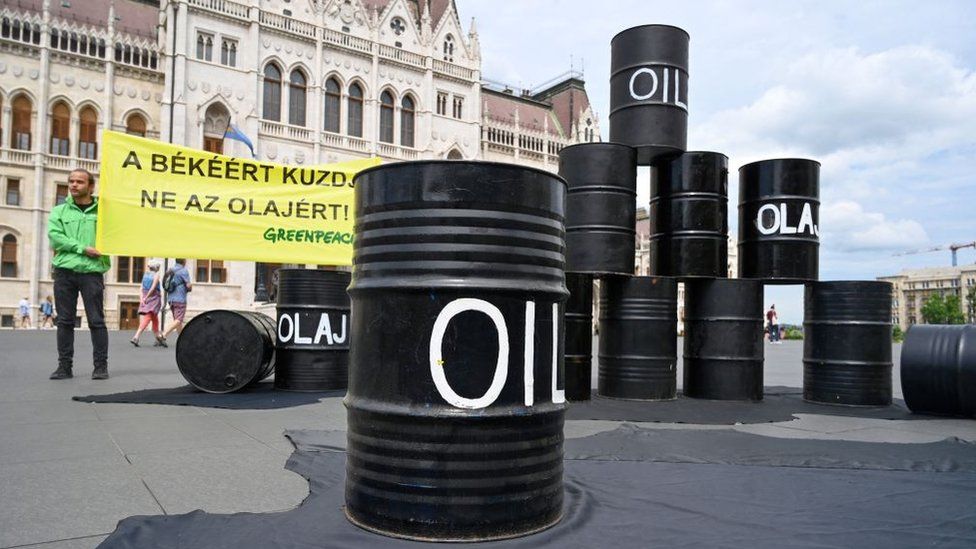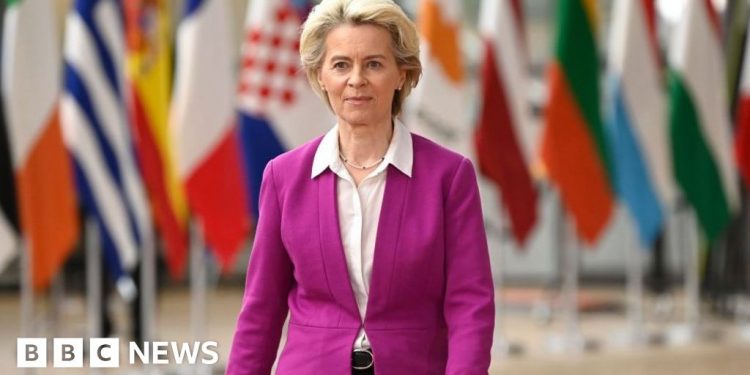EU struggles to resolve Russian oil ban proposal differences
EU members struggled to resolve their differences over a proposed ban on Russian oil imports, with Hungary its main opponent.
The proposed ban is part of a sixth package of sanctions being discussed during a summit in Brussels, which all 27 member states have to agree on.
European Commission President Ursula von der Leyen said her expectations were “low” a deal would be reached.
Ukraine’s President Volodymyr Zelensky urged the EU to stop quarrelling.
The ban on Russian oil imports was initially proposed by the European Commission – which develops laws for member states – a month ago.
But resistance, notably from Hungary, has held up the EU’s troubled latest round of sanctions.
The cost of living crisis being felt across Europe has not helped either. Sky-rocketing energy prices – among other things – have curtailed some EU countries’ appetite for sanctions which could also hurt their own economies.
The lack of agreement has meant that a watered-down version of the proposal has been drafted, which would see pipeline oil exempted from the ban while oil imports delivered by sea would be banned. Hungary – which receives its Russian oil through a pipeline from Ukraine – would therefore still be able to receive its oil through pipelines.

Speaking before the summit, Ms von der Leyen told reporters her expectations were “low” that an agreement would be reached within the next 48 hours, but said it was possible in the longer term.
She added that “it is very important to have fairness for all, we haven’t found a solution for that yet”.
Other EU officials, however, have expressed relative confidence that a deal is close. The EU’s foreign affairs chief Josep Borell said he is “fully confident” the bloc will reach an agreement, while European Council President Charles Michel said that the time was now to decide on a Russian oil embargo.
Despite their optimism, there remains significant obstacles to passing the ban, with Hungarian Prime Minister Viktor Orban stating that there was “no agreement” on the latest draft of sanctions.
Mr Orban said that although the watered-down proposal was a “good solution,” he needed more guarantees that his country’s energy supplies would not be hindered before agreeing to the ban.
“It’s a good approach but we need a guarantee that in the case of an accident with the pipeline… we have to have the right to get Russian oil from other sources,” he told reporters at the summit.
Mr Orban also blamed the European Commission for failing to properly negotiate the ban with member countries.
He said that energy is a “serious issue”, and that “we need solutions and then the sanctions.”
Ukraine’s President Volodymyr Zelensky, who dialled into the summit, urged EU countries to stop their internal “quarrels,” stating that they only helped Moscow.
“All quarrels in Europe must end, internal disputes that only encourage Russia to put more and more pressure on you,” Mr Zelensky said via video-link.
“It is time for you to be not separate, not fragments, but one whole,” he said, calling for a new set of sanctions against Russia, including a ban on Russian oil.
Latvia’s Prime Minister Krisjanis Karins said member countries must not get “bogged down” in their own personal interests.
“It’s going to cost us more. But it’s only money. The Ukrainians are paying with their lives,” he said.
Source: BBC

















